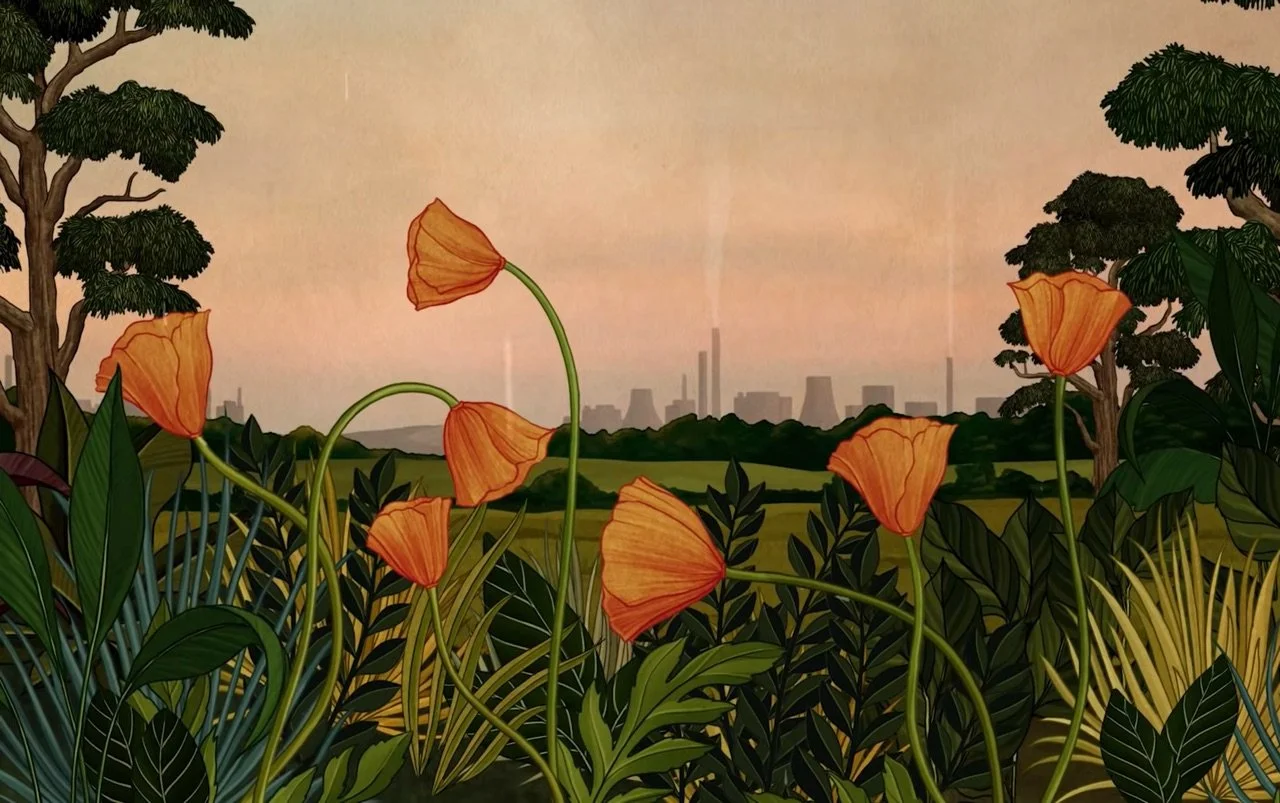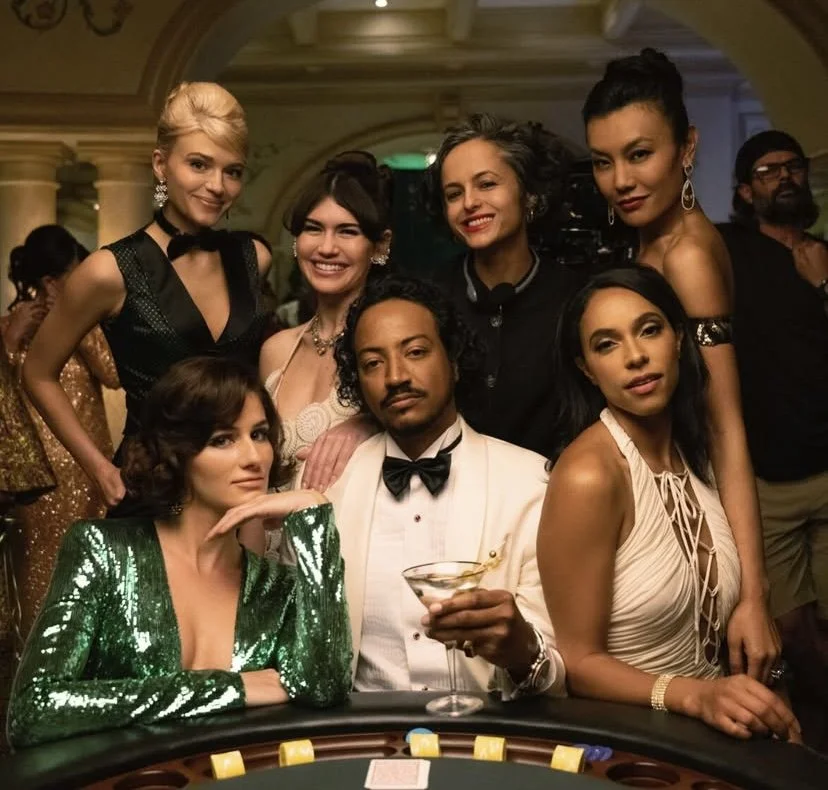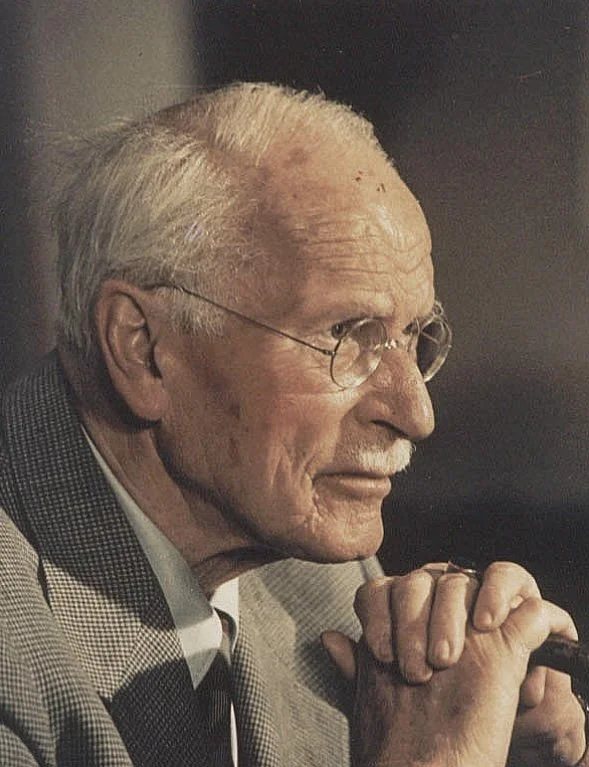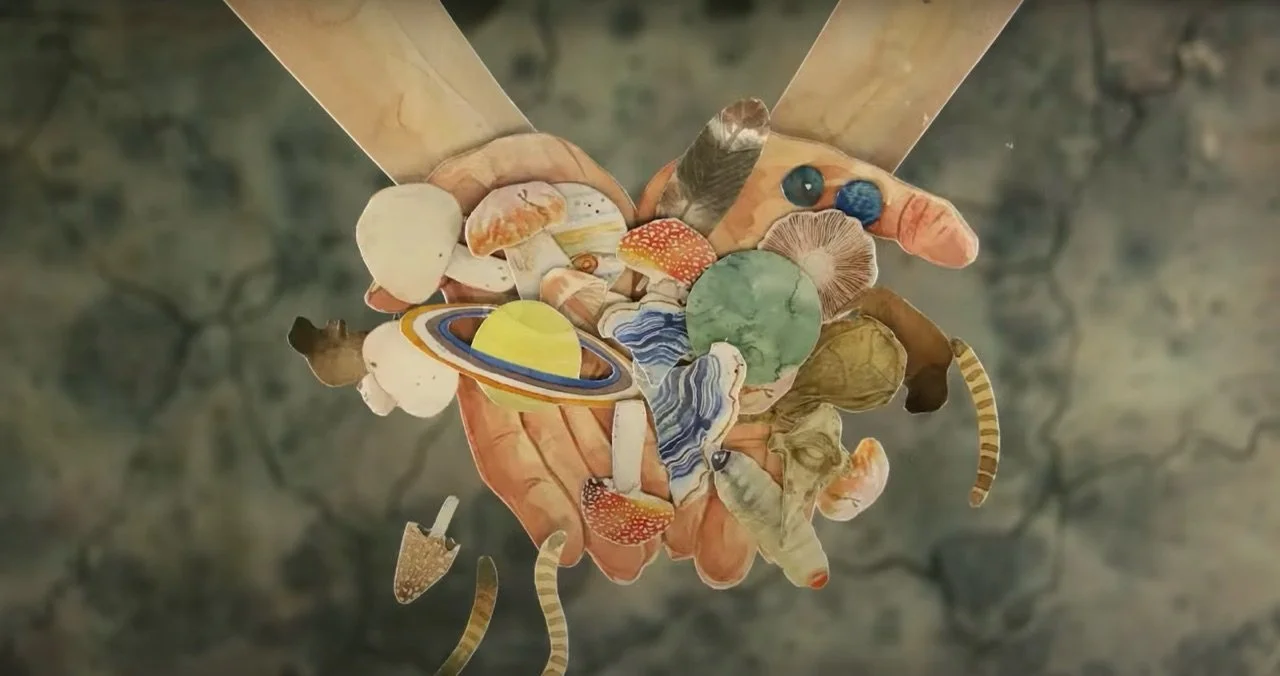
Relationship Conflict as the Antidote to Entropy:
Pluribus, Terry Real, and Psychic Epidemics
According to the infinitely wise couple therapist, Terry Real, we all marry our unfinished business.
As he says:
“Being in a real relationship is the day you realise not only is this person not going to avoid your old wounds, they are exquisitely designed to stick the burning spear right into your eyeball. That’s why you pick the person you pick” (Real, 2024).
The reason for this, he explains, is that it is only by re-encountering our childhood wounding, this time as adults, that we are able to give ourselves what we needed as children and, if our partner is willing and capable of doing the work with us, change the outcome. In other words, it is through relational pain that relational healing becomes possible.
While discussing this with a fellow psychotherapy trainee, we wondered why it had to be this way. In this great cosmic mélange, why don’t we get to be with the Disney Prince or Princess who will forever be patient, understanding, loving, and attuned to us exactly as we are? Why don’t we get the fantasy? Why can’t things be as fluffy and Hollywood as we’d like? Why has God created it this way, when it could have been any way they wanted?
Terry Real gives us the answer. As we say throughout the screenwriting courses:
Conflict = Growth.
It is only by experiencing and adapting to conflict that a character can grow and change, adjusting to their environment and ultimately thriving.
So when we ask why it has to be this way, perhaps conflict is the answer to entropy, the natural tendency toward decay and disorder. Perhaps friction, difficulty, and difference are the very mechanisms through which complexity, resilience, and adaptation arise.
Imagine what life would be like if we were all of the same mind: something that Vince Gilligan invites us to contemplate in his latest TV offering, Pluribus.
In it, [SPOILER ALERT], a space virus causes human kindness to become a contagious phenomenon, leading the entire world to think with a unified mind. Humanity begins sharing resources and knowledge and cooperating fully, without conflict, ultimately bringing about world peace. So far, so good, right?
Well, yes - as Gilligan’s “survivors” (those not infected) discover as they explore this paradigm. You can have whatever you want; no one has to struggle and everything is accommodated. It sounds much like the coddled codependency of the fantasy relationship, doesn’t it? No edges. No friction. How wonderful!
But this way of living has its problems. The civilisation is profoundly vulnerable. If one part experiences a shock, it wipes out a multitude. They cannot kill to eat, and so must consume their dead. And because harm to one is experienced as harm to all, decisive or morally difficult actions become impossible. The civilisation cannot act aggressively, defensively, or selectively without destabilising itself.
They are a civilisation waiting to fall.
It puts me in mind of Jung’s notion of “psychic epidemics” (Jung, 1959): contagions of the collective psyche that spread among the masses and destroy the individual.
As Jung wrote:
“As a rule, when the collective unconscious becomes really constellated in larger social groups, the result is a public craze, a mental epidemic that may lead to revolution or war or something of the sort. These movements are exceedingly contagious - almost overwhelmingly contagious because, when the collective unconscious is activated, you are no longer the same person. You are not only in the movement - you are it…. It gets under your skin….. Then you lose your soul…” (Jung, 1976).
Jung witnessed the madness of World War II and the Cold War and worked with many patients who suffered from the contagion of the psychic epidemics that flourished in those times. His solution to such epidemics centred on preserving individuality and inner authority in the face of mass contagion and groupthink. At the same time, Jung insisted on cultivating self-awareness and psychological differentiation, emphasising the necessity of holding the tension of opposites: good and evil, virtue and vice, without collapsing into denial or moral splitting. He argued that this difficult inner task is also the most powerful means of resisting collective madness.
So perhaps next time we wonder why we cannot sustain the Hollywood-style romance in our lives, or why the rom-com or love story cuts off just at the moment the couple ride off into the sunset, maybe we can console ourselves with the thought that our partner is doing the best they can for us: helping us adapt, survive and grow in a chaotic and entropic world.
References:
Gilligan, V. (Creator). (2025). Pluribus [Television series]. Apple TV.
Jung, C. G. (1959). The archetypes and the collective unconscious (R. F. C. Hull, Trans.; Vol. 9, Part 1). Princeton University Press. (Original work published 1954)
Jung, C. G. (1976). The symbolic life (R. F. C. Hull, Trans.; Vol. 18). Princeton University Press.
Real, T. (2024, October 4). #1 couples therapist: Is your relationship worth saving? Ending love addiction [Audio podcast episode]. In F. Tighinean (Host), The Francesca Psychology Podcast. Francesca Psychology.
Our next Introduction to Screenwriting course starts: Feb 2nd, 2026!
Monday nights - 7-10 pm UK on Zoom. The course costs: £440
Email: contact@lifeinthestory.co.uk

Endings & Beginnings:
Life In The Story
This week marks the end of the Writer’s Room. For the past year, we’ve gathered every other Tuesday night, sharing work, doing writing exercises, answering questions, and building a community of writers. It’s been deeply rewarding, but as all good things do, it’s come to an end.
As we wrap up, I’ve found myself thinking not only about endings, but also about the beginnings they make way for. As one chapter closes, another opens: this December, my wife and I are expecting a baby girl.
I’ve never been good with endings. The thought of saying goodbye makes me tearful, and letting things run their course is hard. But endings aren’t necessarily just about loss. In story structure, the ‘death’ at the end of Act 2 is what allows for transformation, the necessary clearing that makes space for a new paradigm to emerge.
Nature shows us this everywhere: leaves dropping as the nights creep in. Yet we live with the faith that come spring, buds will return and life will bloom again. We’re always cycling through death and rebirth, shedding and sprouting, releasing and renewing.
In writing, the same principle applies. When crafting a story, we might ask: What needs to die within my character for them to truly live? What belief, habit, or fear must they release to face the final battle and seize the grail?
Growth always requires loss. Something old must unmake itself for the new to emerge.
Merlin Sheldrake captures this beautifully in Entangled Life, where he describes an experiment from his childhood:
“We cut the top off a plastic bottle and filled it with layers of soil, sand, and dead leaves, before adding a handful of earthworms. Over the next few days, the worms wound their way through the layers, mixing and stirring. The hard edges between layers dissolved. My father explained that many more unseen creatures do this—tiny worms, bacteria, fungi—all working to unmake life so it can be remade.”
“Composers make pieces of music. These were decomposers, who unmake pieces of life. And unless decomposers unmake, there isn’t anything that the composers can make with.”
That idea, that creation depends on decomposition, feels essential to both storytelling and life. The unmaking is what allows the making.
As I sit at my desk, winter drawing in and my daughter’s arrival approaching, I think about the parts of myself that must die off to make space for the father I’m becoming. There’s a mourning in that, saying goodbye to parts of who I was, but so much hope and excitement. Endings ask something of us. They ask us to trust that letting go isn’t the end of the story. It’s just the beginning of a new one.
Excerpt from Entangled Life by Merlin Sheldrake (2020). Random House.
Our next Introduction to Screenwriting course starts: February 2nd 2026, Monday nights - 7-10 pm UK on Zoom. The course costs: £440
Email: contact@lifeinthestory.co.uk
I CAN BE AN AWKWARD PRICK
Kill Your Darlings and Set Yourself Free
I’ll say it again…
I can be an awkward prick. Which is why the patience of my old writing partner, Jamie Stone, was so essential in our working relationship.
The place where it mattered most was around the issue of ‘killing your darlings’ - allowing an idea you’re really wedded to be cut out of the story in order to make the thing work.
As time goes on, and my script editing and mentorship have become my main focus, it’s something I see again and again.
We’ve all been there. That moment, that scene, that sparkling piece of dialogue you’ve written and KNOW will one day feature on the reel when the BAFTA nominees for Best Screenplay are broadcast.
Sometimes it feels like the WHOLE STORY practically hinges upon it. And yet, when it starts to feel like it’s holding you back - when it becomes the reason your story isn’t working - defences kick in.
First comes the pang of dread you try to push away.
Then it sharpens into focus - “if they say that…then this means-no, I won’t think about that” (denial).
Then maybe someone like Jamie points it out, and you respond with, “I hear what you’re saying, but x…”, they counter with a good response. You get defensive. You might even cast aspersions on their talent, your partnership, their mental health - until finally, knowing what you’re like, they suggest:
“Why don’t we cut and paste that bit into another document so it’s still there, and just experiment without it?”
This seems totally unreasonable, but you politely acquiesce because, well, you know you can be an awkward prick.
And then the unthinkable happens: the story moves forward. The block vanishes. The character makes sense. The plot hole disappears - huzzah! I knew this was a good idea!
Of course, the ripple effect means you might now have a lot of editing to do as changes spread across the story/episode/series*. But that’s better than being stuck with something that doesn’t work.
Buddhism views attachment as a pivotal cause of suffering (Dhuka). Suffering comes from our yearning for permanence, satisfaction, and control in a world defined by impermanence and flux.
In many ways, writing a script induces this kind of suffering.
The attachment to “perfection” in its early stages can really hold you back, and it’s the most common block I see in my students.
And why?
An encounter with infinity (the imaginal realm) is both exhilarating and terrifying. Holding onto something that feels fully formed, even if it’s not working, can feel like an anchor in a storm.
But letting go - accepting the death of an idea - almost always clears the way for something fresh to arrive, and suffering ceases (Nirvana).
When you’re striving over your draft, remember: Alan Ball’s American Beauty started life as a courtroom drama (The Trial of Ricky Fitz) about Lester Burnham’s murder. It was only in the edit that Sam Mendes discarded 30 minutes of footage to shape the Oscar-winning classic we know.
Most recently, with one student, we faced this exact issue.
Her protagonist had always performed a certain action - giving a blowjob in exchange for drugs - and it had been there since the script’s inception.
Neither of us saw how much it was holding the story back until we finally let it go. The effect was tremendous. The script was a comedy, and that moment had always made it darker and more tragic.
Once it was gone, the characters became more innocent and likeable, the theme came through more clearly, and the overall arc of the series came into view.
One moment really can hold the key to the wider picture.
So, my advice to my fellow awkward pricks is this: do your groundwork well, and by all means defend your story and characters.
But hold them lightly (or at least cut and paste them into another document - thanks, Jamie), because you never know when killing your darlings might just set them (and yourself) free.
*This is why I always recommend a systematic development process to minimise darling killing - or as my former New-Yorican scriptwriting mentor Ellin Stein used to say: “Pay now, or pay later - with interest.”
The Flaw is the Engine:
Storytelling, Therapy, and the Gap That Drives Us
Why do we care about characters? What hooks us into them? It’s very often not their brilliance, competence, or success: it’s most often their struggles. Particularly the ones that are brought about by their flaws.
You see, a really compelling character will often make choices informed by their flaws, and it’s these choices that create the very problems they must face.
So the gap between what they think they ‘want’ and what they might actually ‘need’ creates tension. And it’s that gap (almost always unconscious to them) that becomes their engine of transformation.
But this isn’t just in screenwriting, you see this all the time in psychotherapy.
The Flaw is the Filter
A flaw isn’t just a weak spot in a character’s armour. It’s often a defence - and it’s the lens through which they interpret reality.
A narcissistic character doesn’t simply crave attention; they interpret every interaction as a potential threat to their self-worth.
An avoidant character doesn’t just fear intimacy; they see closeness as danger.
The flaw shapes perception, and perception drives choices. And those choices (often well-meaning, often desperate) lead directly to the conflict the character will later have to resolve.
What Looks Like an Obstacle... Is Actually a Mirror
We tend to think the plot ‘happens to’ the character. But in truly compelling stories, the plot is more like a mirror. It reflects the protagonist’s flaw back at them again and again, from every possible angle.
What looks like fate is often a response. The world pushes at where the character is weak - not to punish them, but to facilitate growth (or kill them in the process).
This is why a character who is ‘good at everything' is almost always boring. If they just breeze through the story without being tested in their weakness, there’s no arc. No tension. No change. No meaning.
The Gap Between Want and Need
So the real core of character transformation is the conflict between what the character wants, and what they need.
What they want is clear, external, conscious: success, love, revenge, safety.
What they need is internal, hidden, often painful: healing, humility, truth, responsibility.
They chase what they want until the pursuit stops working, or until the thing they thought would save them is revealed to be another dead end.
And then… they have a choice: to face the need, or double down on the want.
In psychotherapy, this is a familiar pattern.
A person comes in saying, “I just want someone to love me.” But what they need is to explore why they keep choosing people who can’t. Or why, deep down, they don’t believe they deserve love at all.
Another might say, “I want to feel better, I want the pain to go away.” But the need is to finally feel the grief they’ve been suppressing for years, and to stop running from the truth of their experience.
The want is the survival strategy. The need is the path to healing.
Testing the Flaw
Good storytelling doesn’t protect the protagonist. It tests them. It presses on the flaw. The love interest leaves. The promotion backfires. The lie is exposed.
These aren't random obstacles. They’re invitations.
The story isn’t punishing the character. It’s inviting them to transform. And unless their flaw is exposed, unless the thing they don’t want to face is brought right to the surface, nothing will change.
From the Page to the Therapy Room: Kendall Roy (Succession)
Kendall Roy, the heir apparent in Succession, is a character driven by a desperate hunger to prove himself. He wants to become CEO, to win his father’s approval, to finally feel like he matters. On the surface, he’s chasing power, but beneath that lies a deeper psychological need: to be loved, to be safe, and to be seen without having to perform.
His flaw: a deep insecurity masked by bravado, drives him into boardrooms, betrayals, and breakdowns. Every decision he makes in pursuit of success only widens the chasm between who he is, and who he thinks he needs to be.
His addiction is more than a plot device, it’s a mirror of his emotional life. Drugs and alcohol offer momentary relief from the unbearable emptiness of never having been enough for his father. Each relapse is less a failure of will and more a return to a familiar self: wounded, numb, and ashamed. Kendall’s efforts at recovery tend to coincide with a new project, a new role to inhabit, a new version of himself to believe in. But the pain always catches up because he never allows himself to truly grieve what he never received.
Ultimately, Kendall is a tragic figure not because he wants too much, but because he can’t stop wanting the wrong thing. His arc is a psychological parable: when we define ourselves by what we lack, we chase goals that only deepen the wound. His flaw isn't that he’s weak, it’s that he keeps trying to fix his pain with the very tools that caused it.
And like many clients in therapy, the breakthrough would come not from finally winning, but from putting down the mask and facing the grief. Only then could he stop being Logan’s shadow, and start truly being himself.
But hey, where would be the fun in that for the viewer?
Final Thought: Story as Soul Work
A lot of good stories are a kind of therapeutic journey. A character is thrown into chaos. They reach for what they want. And through the conflict, they’re forced to confront what they truly need.
Not all stories end with resolution. Some characters die clinging to the want. Others awaken. But the beauty (and entertainment) is in the struggle.
And so it is with ourselves. We all live with our flaws, filters, and survival strategies. We all think we want one thing, until the stories of our lives ask us:
“But what is it that you really need?”.
‘CHEKHOV’S HANDJOB’
or
Why The White Lotus Season 3 Was A Bit Disappointing
Warning: To say that this article contains spoilers would be an understatement.
Setting the Bar in Sicily
Let me start by saying that I absolutely loved The White Lotus Season 2. It was the best TV I’d watched in years. So much so that I dedicated a whole session of the “6-Month Episodic TV” course to breaking down its character arcs: how they felt rich, complete, and thematically cohesive.
Each storyline explored sexual politics and power dynamics with such clarity and suspense, intersecting beautifully with the central theme to offer a rich and satisfying dramatic interrogation.
It had me hooked up until the very last moment, where the body in the water (the now classic Lotusian cold open device designed to have the audience asking “who’s body is that?” and “how did we get here?” so that you’ll stick around to the finale to find out) could really have been anyone out of the glittering array of characters.
So as you can imagine, I was really excited about TWL3, and sat down to it having done my best to avoid anything on the internet that might give away the identity of the corpse floating in the Thai hotel’s jungle waterways.
Sawadee Khắp Thailand
On paper, The White Lotus 3 had everything. A luscious new location. A phenomenal cast of newcomers: Rick and his warm-hearted girlfriend Chelsea; the wealthy, sexually-charged Ratliff brothers Saxon and Lochlan; the wellness-return of Belinda (hello again), and returning villain Greg, now posing as “Gary,” Tanya’ Mcquoid’s weaselly widower.
Shots are fired, a body hangs in the water, let’s go!
And then suddenly, just like that, out of nowhere - nothing really happened.
Chekhov’s Gun
Anton Chekhov famously said something like: “If a gun is on the mantelpiece in the first act, it must go off in the third.” It’s a storytelling rule about payoff: don’t introduce something unless it serves a purpose later. And I’d add the reverse: if something is going to explode in Act 3, you have to set it up early. This is how we avoid the dreaded deus ex machina ending: surprises that feel unearned, because the groundwork wasn't laid.
The White Lotus 3 flirted with setup after setup, metaphorical mantelpieces groaning with Chekhovian guns, and then... just sort of wandered off to get a massage.
Let’s look at a few examples.
1. The Ratliff Brothers: Incest with No Consequences
From episode one, Lachlan’s hungry glances at his brother Saxon’s body telegraph the unspoken taboo at the heart of their dynamic. It all comes to a head (literally) when he gives his brother a handjob during a threesome. Gross? Yes. Dramatic? Possibly. But after a brief “that was weird” chat, it’s... never mentioned again.
No fallout. No reckoning. No spiral of shame or violence. Just a plot beat that seemed to disappear into the spa mist.
2. The Poison Seeds That Didn’t Kill
In episode one, we learn about the lethal pong pong seeds therefore, Chekhov demands someone eat them later. Sure enough, Lachlan accidentally eats them... and then doesn’t die. Not even a hospitalisation. Ok, he meets God but doesn’t have much to say about that either. I actually wish he had died because then I would have felt something.
3. Frank’s Monologue That Went Nowhere
Frank delivers a powerful, raw confession about his past sex addiction, including experiences dressing as an Asian woman and engaging in transactional sex with tourists. It’s a moment brimming with psychological complexity. Surely this is laying the groundwork for something later: shame, temptation, collapse, redemption? Nope. But it could have been so interesting(!).
4. Greg’s Sex Worker Girlfriend: A Non-Twist
We spend multiple episodes with Greg’s girlfriend, a mysterious sex worker who seems to be manipulating him... or maybe being manipulated... or maybe just likes having sex on yachts. But ultimately? She has sex. And then continues having sex.
5. Greg, Belinda and Zion
Belinda and Zion ask Greg for $5m, and he gives it to them.
6. Rick’s Father Drama
Even Rick and Chelsea’s deaths in the shootout at the end feels flat and contrived. The revelation that the man who killed Rick’s father is his father is all a bit of a nothing-burger. No-one asked, but ok, now we know.
So What Went Wrong?
It’s not that The White Lotus 3 didn’t try to set up interesting dynamics: it’s that it didn’t pay them off. You can’t tease incest, poisoning, sex addiction, and patricide and then resolve none of it with any dramatic weight.
Part of the show’s brilliance has always been its ability to weave character studies with genre tension, and satire with suspense. But this time, it felt like creator Mike White was more interested in the vibe than the story. The result is a season that looks great, sounds interesting, but feels dramatically inert. If you have so many compelling, intricately-crafted guns, it’s such a shame when they don’t go off.
Our next Introduction to Screenwriting course starts: May 12th, 2025! Monday nights - 7-10 pm UK on Zoom. The course costs: £440
email: contact@lifeinthestory.co.uk
Carys Thomas Signed By Independent Talent Group
12.06.2024
We are delighted to announce that our alumna Carys Thomas has been signed by Francesca Devas at Independent Talent Group. Carys is a fabulously talented, prolific and hard-working writer and we wish her all the best with all her projects.
Life In The Stories #1
10.01.2024
PHILIP BARANTINI
In this revealing discussion, seasoned actor, producer and award-winning BOILING POINT-director Philip Barantini talks about his career, addictions, and the turning points in his life that have lead to his success.
Holly Hunter wins Yarns 2023!
4.12.2023
Our very talented former student Holly Hunter has won Yarns 2023 with her comedy short BANANA BOAT.
It’s a whimsical comedy that sees two mothers and their sons face off over tickets for the final banana boat ride of the summer. It’s very funny, and it’s very good.
Carys & Thor.
Former students Carys & Thor have made two short films amongst other projects since the course. They are a super-talented writing and directing partnership and you can watch their work below.
Reducing Reoffending & The Hero’s Journey at HMP Thameside.
‘The Hero’s Journey’ at HMP Thameside
Over the summer, we held 6 workshops with a group of inmates exploring their personal mythology - the stories of their lives and how they relate to them - via Joseph Campbell’s concept of ‘The Hero’s Journey’. ‘The Hero’s Journey’ is made up of several universal stages that make up the structure of all stories, from ancient myths and scriptures, to modern films and TV episodes, and ultimately the stories that we are living in our own lives.
In weekly group discussions inspired by the stages of the journey e.g. ‘The Ordinary World’, ‘Meeting The Mentor’, ‘The Ordeal’ and ‘Resurrection’, the participants were encouraged to look at their lives from a mythological perspective, and to recognise any patterns and themes that they might share with each other.
Along the way, discussions were supported and inspired by meditations and visualisations, e.g. asking the members to imagine and then draw items given to them by their mentors to help them with that particular stage of the journey. The process was highly bonding for the group, with honesty and vulnerability on show once trust had been established, and with personal insights often revealing themselves to the increasingly supportive group. As we reached the end of the journey, it became clear that many members had really benefitted from the process, learning not just about themselves and their own qualities but being able to recognise those in others by connecting to the group. In prison it can be difficult for inmates to access or seek therapeutic resources, especially due to the stigma attached to the perception of seeking therapy, so it seems ‘The Hero’s Journey’-style workshops can be an effective way for participants to find themselves engaging in a process without feeling self-conscious.
The mythological element also allows for them to talk about difficult aspects of their lives from a safely detached distance when necessary, and share with an understanding group. As became apparent during our sessions, when themes in their collective backstories emerged e.g. abuse and addiction, it allowed them the opportunity to connect with each other and see themselves and their behaviour as possible adaptations to challenging circumstances rather than to view themselves as ‘bad’ or ‘broken’, and therefore fully capable of rehabilitation. Overall, ‘The Hero’s Journey’ seemed like a great success with a powerful potential to be applied to more groups at Thameside in the coming year.

























